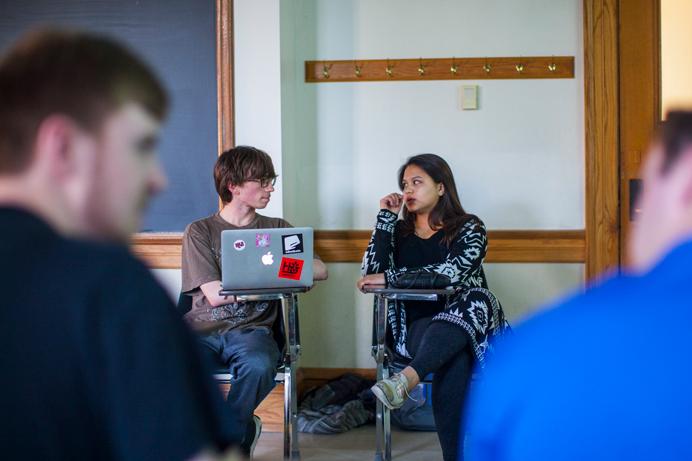By Sarah Stortz
With a recent U.S. missile attack that has caused damage to a Syrian airfield, conflicting opinions have arisen in the University of Iowa community.
President Trump ordered the Navy to launch dozens of Tomahawk missiles toward a Syrian airbase on April 6, according to an article on Vox. This was the first time the United States intentionally bombed a Syrian regime since 2011, the article said.
The article said Trump announced after the attack that he wanted to retaliate against Syrian President Bashar al-Assad because of Syria’s use of chemical weapons on civilians on April 4. According to CNN, the chemical attack has killed at least 72 people.
In response to this action, the UI Debate Club hosted a discussion Monday night, arguing whether Trump made the appropriate move.
Debate Club Vice President Jonathan Paunove said the club hosted the debate in order to get more people educated on what’s going on.
“A few days ago, right when Trump sent out the 59 missiles, I personally didn’t know that much about the issue,” he said. “I saw some messages about it on Fox News briefly describing it, so I thought educating more people on the issue would be a good way to bring something relevant.”
All of the debating students were split into two groups, regardless of their personal beliefs. One of the groups was supposed to argue against Trump’s decision, while the other argued for it. Paunove said the protocol was supposed to have them look at both the pros and cons of each side.
UI sophomore Connor Holman, who was a part of the group against Trump’s decision, argued the president only wanted to make it seem as though the attack was about protecting civilians.
“If we act like this is a great choice, we need to recognize the further damage that we have caused,” Holman said.
Another member against the decision argued that if the U.S. was concerned about saving lives, it could have taken in Syrian refugees.
Holman said he felt Trump was not thinking of the American people when he made the attack.
“Trump technically works for us; he can’t make all of the decisions,” Holman said. “I actually want to know [what] the government is doing.”
On the contrary, UI freshman Ty Gelinske, debating for the group in favor of Trump’s move, said the U.S. now has a new administration that citizens should adapt to.
“This was an attack that was intended to be used one time,” he said. “[Assad] would’ve just kept using chemical attack unless we did something. There’s no ‘what-if’ anymore. This is what was going to happen.”
Gelinske said that this decision came from bipartisan support, with the majority of Congress agreeing with this decision.
Another member from the group in favor of the strike said this decision would inevitably cause controversy, pointing out that 2016 presidential candidate Hillary Clinton also supported using missiles in the Middle East. They made a hypothetical prediction that if Clinton were president, she would have received opposition from Republicans for making a similar choice.
Paunove said he was overall satisfied with how the students handled the debate.
“People really voiced their opinion well and talked about what they wanted to talk about,” he said. “They related to past issues that have happened before in the Middle East.”







